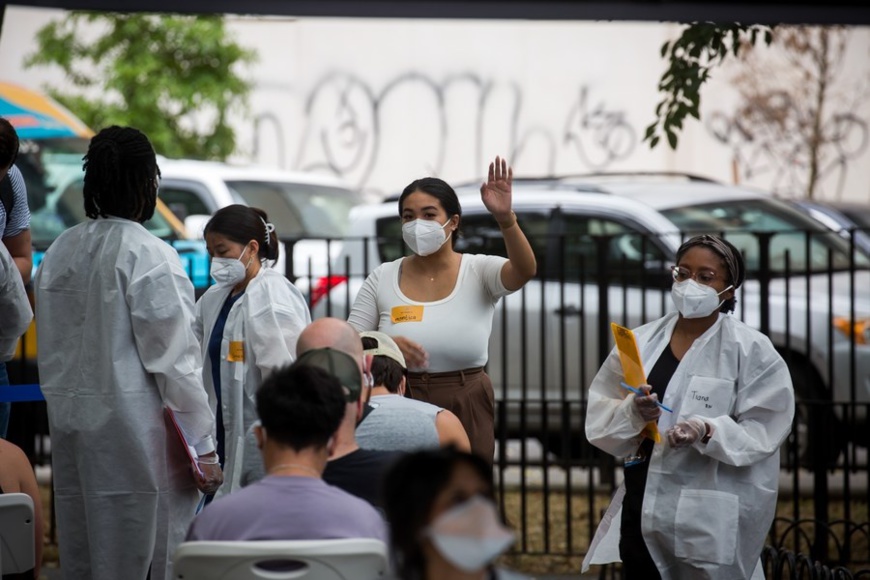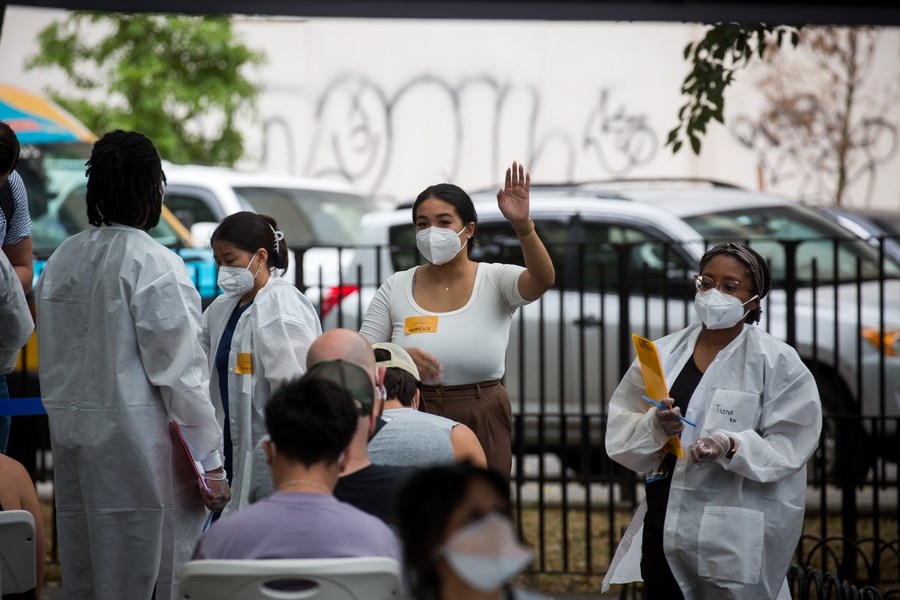By Zhong Sheng, People's Daily

(Zhong Sheng is a pen name often used by People's Daily to express its views on foreign policy and international affairs.)
Facing the spreading monkeypox cases, U.S. media outlets are questioning authorities why the U.S. is not learning from its experiences.
According to the latest statistics released by the U.S. Centers for Disease Control and Prevention (CDC), 17,432 monkeypox cases had occurred in the country as of Aug. 26, the highest in the world.
With the soaring number of infections and slow response, it is worrying many public health experts that the U.S. might repeat its failure in COVID-19 control.
Monkeypox virus is not new, and both testing measures and vaccines are available. Even so, the U.S. government still missed the best opportunities to put the disease under control. From reporting the first local case on May 18, it took more than two and a half months for the country to declare monkeypox a public health emergency.
American media listed the poor performance of the U.S. in mokeypox response, such as insufficient testing capacity, inefficient distribution of vaccines, high medical expenses and lack of government-public communication, which exposed the loopholes of the U.S. health system.
The Boston Globe said on its website that U.S. public health officials and political leaders have responded to monkeypox by repeating nearly every mistake they made in 2020 with COVID-19.
Scott Gottlieb, former Food and Drug Administration commissioner, noted that the monkeypox may become another failure of U.S. public health policy because of the slow response of the U.S. government.
The failures of the U.S. in fighting diseases mirror a fact that the country is losing social governance.
As U.S. politics polarizes, both Democratic and Republican politicians always take the fight against diseases as a tool for them to win in political conflicts.
During the COVID-19 pandemic, blame game was often seen in the country where federal, state and local governments are controlled by different political parties. Federal response measures were against those released by some state governments, and states even scrambled for anti-virus supplies.
Now, it is like "yesterday once more." According to U.S. media, the White House estimated to Congress in July that it may need $7 billion to mount a response to the nation's monkeypox outbreak. However, due to the different stands of the Democrats and Republicans, it remains unclear when Congress would approve the spending, let alone establishing an effective epidemic prevention system.
Washington Post noted that the U.S., seem stuck in a pattern of panic and neglect, too often declaring an emergency about a virus after it has run out of control, rather than getting ahead of it.
The right to life is a basic human right. Both the stressful monkeypox and the COVID-19 pandemic killing over a million Americians and causing sequelae for over 23 million, are consequences of U.S. disease control failures, as well as violations of the human rights enjoyed by Americans.
The U.S. is the world's most medically advanced country, but it has failed to protect the human rights of its people with its medical resources.
An American physician recently said on an article published on British Medical Journal that U.S. medical organizations have failed to meet the basic demand of monkeypox patients in testing, treatment and vaccination.
"Human rights" is a term that's frequently mentioned by U.S. politicians, but where are they when U.S. citizens are losing health and even lives in diseases? This reveals the hypocrisy of the so-called American human rights.
The distribution of monkeypox cases once again indicates the deep-rooted and systemic racial inequality in the U.S.
The CDC said that nearly 28 percent of monkeypox cases in the U.S. are among Black individuals, and 33 percent are among Hispanic people. Some U.S. media organizations believe that the data completely underestimated the impacts on ethnic minorities from the disease.
For instance, 82 percent of monkeypox cases in Georgia are among African Americans, who account for only 1/3 of the state's population, and around 20 percent of North Carolina's population are identified as Black, who make up over 70 percent of the state's monkeypox infections.
This is another piece of evidence suggesting that U.S. failures in disease control are in direct relation with the country's systemic racial discrimination.
These failures should have taught the U.S. a harsh lesson. To alleviate the pain felt by the public, U.S. politicians should make less empty talks about so-called democracy or human rights, and take more concrete actions to protect the people from being hurt by diseases.
Covering up mistakes and passing the buck to other countries is meaningless. It cannot save the failing American democracy, nor will it conceal the hypocrisy of American human rights.
According to the latest statistics released by the U.S. Centers for Disease Control and Prevention (CDC), 17,432 monkeypox cases had occurred in the country as of Aug. 26, the highest in the world.
With the soaring number of infections and slow response, it is worrying many public health experts that the U.S. might repeat its failure in COVID-19 control.
Monkeypox virus is not new, and both testing measures and vaccines are available. Even so, the U.S. government still missed the best opportunities to put the disease under control. From reporting the first local case on May 18, it took more than two and a half months for the country to declare monkeypox a public health emergency.
American media listed the poor performance of the U.S. in mokeypox response, such as insufficient testing capacity, inefficient distribution of vaccines, high medical expenses and lack of government-public communication, which exposed the loopholes of the U.S. health system.
The Boston Globe said on its website that U.S. public health officials and political leaders have responded to monkeypox by repeating nearly every mistake they made in 2020 with COVID-19.
Scott Gottlieb, former Food and Drug Administration commissioner, noted that the monkeypox may become another failure of U.S. public health policy because of the slow response of the U.S. government.
The failures of the U.S. in fighting diseases mirror a fact that the country is losing social governance.
As U.S. politics polarizes, both Democratic and Republican politicians always take the fight against diseases as a tool for them to win in political conflicts.
During the COVID-19 pandemic, blame game was often seen in the country where federal, state and local governments are controlled by different political parties. Federal response measures were against those released by some state governments, and states even scrambled for anti-virus supplies.
Now, it is like "yesterday once more." According to U.S. media, the White House estimated to Congress in July that it may need $7 billion to mount a response to the nation's monkeypox outbreak. However, due to the different stands of the Democrats and Republicans, it remains unclear when Congress would approve the spending, let alone establishing an effective epidemic prevention system.
Washington Post noted that the U.S., seem stuck in a pattern of panic and neglect, too often declaring an emergency about a virus after it has run out of control, rather than getting ahead of it.
The right to life is a basic human right. Both the stressful monkeypox and the COVID-19 pandemic killing over a million Americians and causing sequelae for over 23 million, are consequences of U.S. disease control failures, as well as violations of the human rights enjoyed by Americans.
The U.S. is the world's most medically advanced country, but it has failed to protect the human rights of its people with its medical resources.
An American physician recently said on an article published on British Medical Journal that U.S. medical organizations have failed to meet the basic demand of monkeypox patients in testing, treatment and vaccination.
"Human rights" is a term that's frequently mentioned by U.S. politicians, but where are they when U.S. citizens are losing health and even lives in diseases? This reveals the hypocrisy of the so-called American human rights.
The distribution of monkeypox cases once again indicates the deep-rooted and systemic racial inequality in the U.S.
The CDC said that nearly 28 percent of monkeypox cases in the U.S. are among Black individuals, and 33 percent are among Hispanic people. Some U.S. media organizations believe that the data completely underestimated the impacts on ethnic minorities from the disease.
For instance, 82 percent of monkeypox cases in Georgia are among African Americans, who account for only 1/3 of the state's population, and around 20 percent of North Carolina's population are identified as Black, who make up over 70 percent of the state's monkeypox infections.
This is another piece of evidence suggesting that U.S. failures in disease control are in direct relation with the country's systemic racial discrimination.
These failures should have taught the U.S. a harsh lesson. To alleviate the pain felt by the public, U.S. politicians should make less empty talks about so-called democracy or human rights, and take more concrete actions to protect the people from being hurt by diseases.
Covering up mistakes and passing the buck to other countries is meaningless. It cannot save the failing American democracy, nor will it conceal the hypocrisy of American human rights.
 Menu
Menu
 U.S. repeating mistakes it has made with COVID-19
U.S. repeating mistakes it has made with COVID-19
















